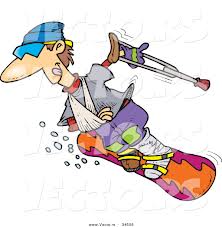 An early winter storm, dubbed Boreas by the Weather Channel, has already dumped heavy snows on the southern Rockies and is threatening the Northeast with much of the same. However, this early holiday gift for skiers may be too much too soon. Over 600,000 people are injured each year while skiing or snowboarding on American slopes. Many of those injuries stem from lack of preparation. Enthusiasts usually spend a lot of time and energy on finding the right skis, boots and clothing, but don’t spend enough time on the most important piece of ski equipment – their bodies. Winter sports conditioning should begin 6-8 weeks before the start of the season. Investing in lessons, no matter how seasoned a skier/snowboarder you are, can help you avoid injury. The better your technique, the less likely you are to put undue strain on your joints, especially your knees.
An early winter storm, dubbed Boreas by the Weather Channel, has already dumped heavy snows on the southern Rockies and is threatening the Northeast with much of the same. However, this early holiday gift for skiers may be too much too soon. Over 600,000 people are injured each year while skiing or snowboarding on American slopes. Many of those injuries stem from lack of preparation. Enthusiasts usually spend a lot of time and energy on finding the right skis, boots and clothing, but don’t spend enough time on the most important piece of ski equipment – their bodies. Winter sports conditioning should begin 6-8 weeks before the start of the season. Investing in lessons, no matter how seasoned a skier/snowboarder you are, can help you avoid injury. The better your technique, the less likely you are to put undue strain on your joints, especially your knees.
Once fully conditioned and technique savvy, here are a few more tips to avoid having your ski vacation end too soon:
- Don’t Crank Up the DIN Setting: The DIN is the tension release mechanism which determines how quickly the ski bindings will open during a fall or accident. Settings adjust for weight (in kilograms) and abilities…so be honest about both!
- Don’t Drink and Slalom: Just as alcohol and driving don’t mix, drinking dehydrates, impairs judgement and slows reactions when skiing/snowboarding. Since most accidents happen late in the day, avoid that lunchtime glass of wine!
- Don’t Overdo It: Most muscle fatigue occurs 48 hours after starting the activity. So take time off after two days in the powder, and use the lift at the end of each day to reduce the strain on tired muscles!
- Don’t Hotdog It: Start slow and easy…beginners should hit the bunny slope before tackling the Black Diamonds. Skiing or boarding off-peak reduces the dangers from sudden evasive measures to avoid other skiers!
- Don’t Avoid Medical Attention: Shrugging off an injury no matter how minor, can lead to serious complications and further damage. Any swelling of the limbs or head injury should be attended to by facility medical staff. Never ski on a swollen knee. Better safe than sorry!
Winter may have already arrived for some parts of the country, but there is still time to get the advice of your local sports trainer or PT before strapping on those skis/snowboards. Got some injury prevention tips you want to share with us? Leave a comment on our Facebook page.